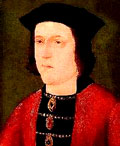| Edward Plantagenet was the eldest surviving son of Richard Duke of York. He succeeded to his father's titles when the latter was killed in a battle with the Lancastrians (30 Dec 1460) and became the chief claimant to the throne in the war with King Henry VI and his wife, Queen Margaret. The defeat of the Lancastrian barons at Mortimer's Cross (2 Feb 1471) opened the way to London. Edward was acclaimed king by a crowd gathered in St. John's Fields (1 Mar 1461), and a resolution embodying this acclamation was presented to him at Baynard's Castle. On 2 Mar 1461 the articles setting forth Edward's title were proclaimed in London and approved by a "Great Council" of the lords spiritual and temporal on 3 Mar 1461. After a solemn ceremony at St. Paul's Cathedral, Edward moved to Westminster, where he was acclaimed King Edward IV (4 Mar 1461). An investiture ceremony at Westminster Abbey followed the same day. On 29 Mar 1461 Edward defeated the Lancastrian army at Towton. The Lancastrian resistance in the north of England lasted until 1464, when the king's cousin, Richard Neville Earl of Warwick, put an end to the attempts to restore Henry VI. Warwick enjoyed a great influence at court and worked for an alliance with France, but his scheme to conclude marriage with a French princess, Bona of Savoy, was thwarted when Edward secretly married Elizabeth Woodville (1464). The queen's relatives gradually deprived Warwick of his power and he turned his armies against the king. Edward's army lost a key battle of Edgecote (26 Jul 1469) and he himself was subsequently captured (Aug 1469) and held by Warwick at Warwick Castle, then at Middleham. Incapable of governing the realm, Warwick released the king (Sep 1469), but made an alliance with Queen Margaret and King Louis XI of France to restore Henry VI. Facing an invasion of Warwick's army, Edward IV set sail on 2 Oct 1470 and took refuge in Burgundy. Aided by the Duke of Burgundy, Edward returned to England to claim his lands as Duke of York, but soon renewed his claim to the crown issuing proclamations from the town of Warwick and calling himself king (2 Apr 1471). He progressed with his forces towards London, where he seized the person of Henry VI and was restored as king (11 Apr 1471). Then he moved north and soundly defeated Warwick's army at the battle of Barnet (14 Apr 1471), where both Warwick and his brother John Neville were killed. Nearly all the remaining Lancastrian leaders, including Henry's son, Prince Edward, were killed at Tewkesbury (4 May 1471). Having obtained a large grant from Parliament, Edward IV formally appointed his son, Edward Prince of Wales, custos of the realm (20 Jun 1475), and at the head of large army invaded France. However, his ill-prepared allies, the Burgundians, failed to help Edward IV and he conceded to a profitable agreement with Louis XI at Picquigny in August 1475. The last years of Edward's reign saw a progress in law enforcement and revival of trade. In 1482 Louis XI repudiated the Treaty of Picquigny and the annual tribute to England, but Edward IV fell ill and died before he could lead a new invasion of France. [1; 2] |

